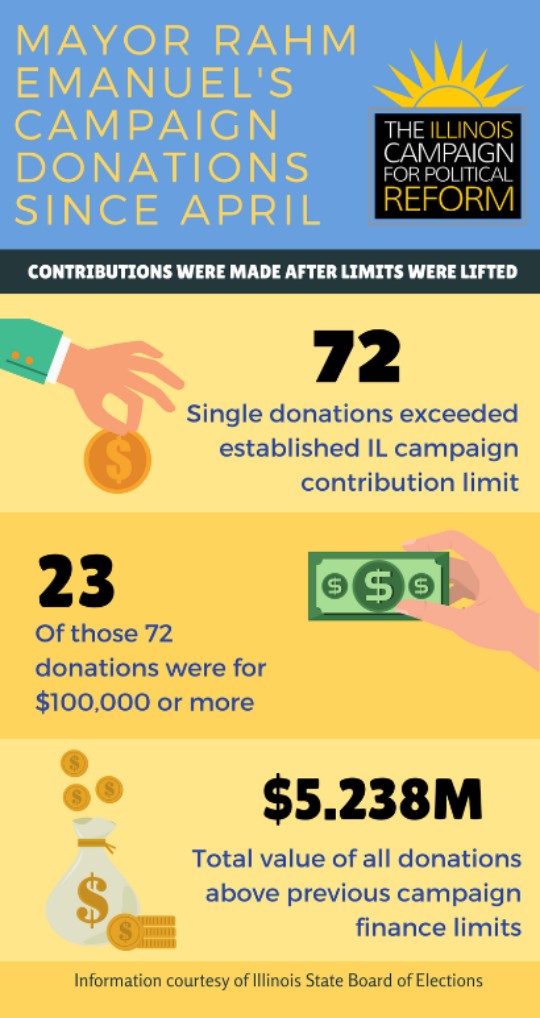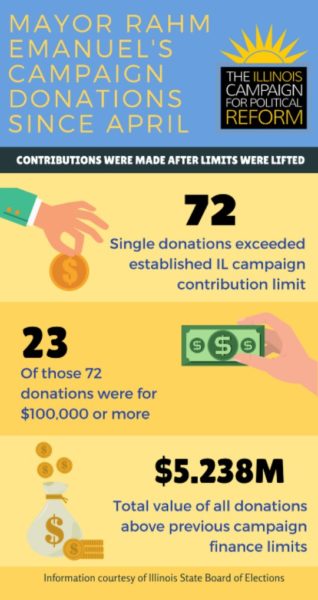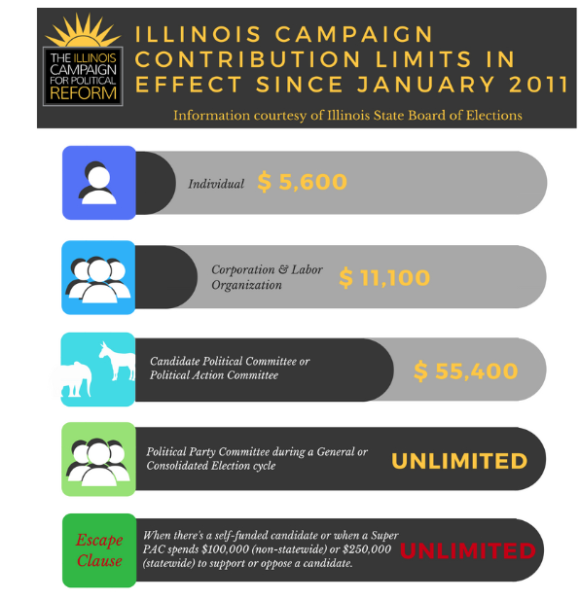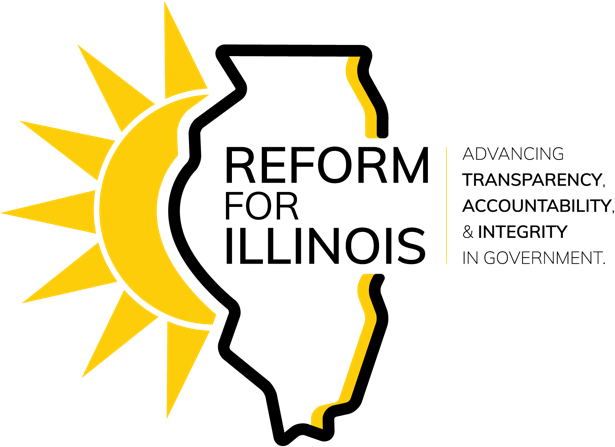Mega Donors Still Winning Under Illinois’ Campaign Finance Restrictions

In the last three months, Chicago Mayor Rahm Emanuel has raised about $5.2 million in his bid for a third term, with much of the money coming in just a few dozen large checks written by wealthy backers.
Such eye-popping checks – several large enough to pay off an average voter’s mortgage – vividly illustrate how a campaign law intended to reign in the influence of moneyed interests has, in practice, fallen short. That law was signed in December 2009 as lawmakers scrambled in the wake of Gov. Rod Blagojevich’s arrest, and it set limits to campaign contributions for the first time. Today, those limits are $5,600 for individuals, $11,100 for corporations and unions, and $55,400 for political action committees.
But the law includes an escape clause: If a wealthy candidate in a non-statewide election wades into a race with at least $100,000 of their own money, then all caps are removed and wealthy donors can contribute as much as they want. For statewide elections, the threshold is $250,000.
Voters are now seeing that escape clause in action with the current Chicago mayoral race thanks to millionaire businessman Willie Wilson, who donated $100,000 of his own money to his mayoral campaign in April.
A clear beneficiary of that six-figure check is turning out to be Emanuel and those donors wealthy enough to contribute high dollar amounts. After Wilson triggered the“escape clause,” Emanuel has taken in 72 donations over the limits established by the General Assembly, totaling about $5.2 million. Twenty three of those 72 contributions were $100,000 or more, according to Illinois State Board of Elections records.

In all, nearly $11 million has been raised among the nine contenders for mayor, but Emanuel has more than $9.1 million of that total. As of July, former Chicago Police Department Superintendent Garry McCarthy has reported raising $399,827, former Chicago Police Board Chair Lori Lightfoot has reported raising $391,188, and former Chicago Public Schools CEO Paul Vallas has reported raising $381,000.
Emanuel’s largest donation is $500,000 from Michael Sacks, CEO of Grosvenor Capital Management, a Chicago-based asset management firm. On that same day, April 20, the mayor also received $200,000 from Wicklow Capital, a Chicago-based venture capital firm: $133,333 from firm president Daniel Tierney and $66,667 from firm director Stephen Schuler.
Then, in June, three executives at Madison Dearborn Partners, a Chicago-based private equity investment firm, pumped $705,000 into Emanuel’s campaign. Co-CEO Sam Mencoff contributed $305,000 while Co-CEO Paul Finnegan and Chairman John Canning, Jr. donated $200,000 each.
Organized labor has also chipped in big for Emanuel, with $250,000 each coming from the Engineers Political Education Committee, the Ironworkers Political Education Fund, the Chicago Land Operators Joint Labor-Management PAC, and the LIUNA Chicago Laborers’ District Council PAC.
Some influential Chicago players have also used the opened floodgates to fund Emanuel’s challengers. In July, Blackhawks owner Rocky Wirtz provided Vallas with $200,000 via donations from several companies he owns.

Illinois Contribution Limits
The law that established Illinois’ first campaign contribution limits didn’t go into full effect until Jan. 1, 2011, when a Chicago mayoral election was fewer than two months away.
Sine then, though, major Illinois races have commonly tossed aside the law’s contribution limits, including for the two most recent gubernatorial and Chicago mayoral campaigns.
The race to see who will replace Attorney General Lisa Madigan is another recent example. Fight Back for a Better Tomorrow made a $255,000 independent expenditure in support of Democratic candidate Kwame Raoul on June 27. The same law that applies for self-funding wealthy candidates also applies to independent expenditure committees, which are also known as Super PACs.
How Chicago Compares to Other Major U.S. Cities
Big city races don’t have to be dominated by a handful of mega donors.
When Bill de Blasio succeeded New York City Mayor Michael Bloomberg in 2013 and won re-election in 2017, he collected $14.5 million and $10 million, respectively. Despite New York City mayoral candidates having a $44,000 individual contribution limit, de Blasio’s largest single donation was only $9,900 in both elections. When Eric Garcetti ran for mayor of Los Angeles in 2013, he was able to muster nearly $5 million in contributions with the largest single donation totaling just $22,398.
Those $22,398 and $9,900 donations pale in comparison to Emanuel’s hefty $250,000, $305,000, and $500,000 checks, and that disparity stems from Illinois’ unique campaign finance laws.
Some states have fairly straightforward contribution limits, such as Florida, where donations from any source to a candidate are maxed out at $5,000 per election cycle. Other states, such as Texas, have no restrictions for individuals, political parties, and political action committees but prohibit contributions from corporations and unions, according to the National Conference of State Legislatures.
Illinois’ system, however, at first seems designed to limit the influence of large donors, but it ultimately leaves the wealthy still holding all the cards. The typical Illinois voter is hard pressed to compete with the attention that such large checks inevitably garner. And their voices will continue to be drowned out if lawmakers don’t enact more comprehensive campaign finance reform, such as a small-donor matching system.
ICPR supported the existing campaign finance law as a step in the right direction – one that started to finally take Illinois out of a Wild West system of virtually no limits. But as we know, money in politics is like water on a flat roof and will find a way in, if allowed. ICPR remains committed to research and promote further reforms that place the voices of the many over the money of the few.
Back
